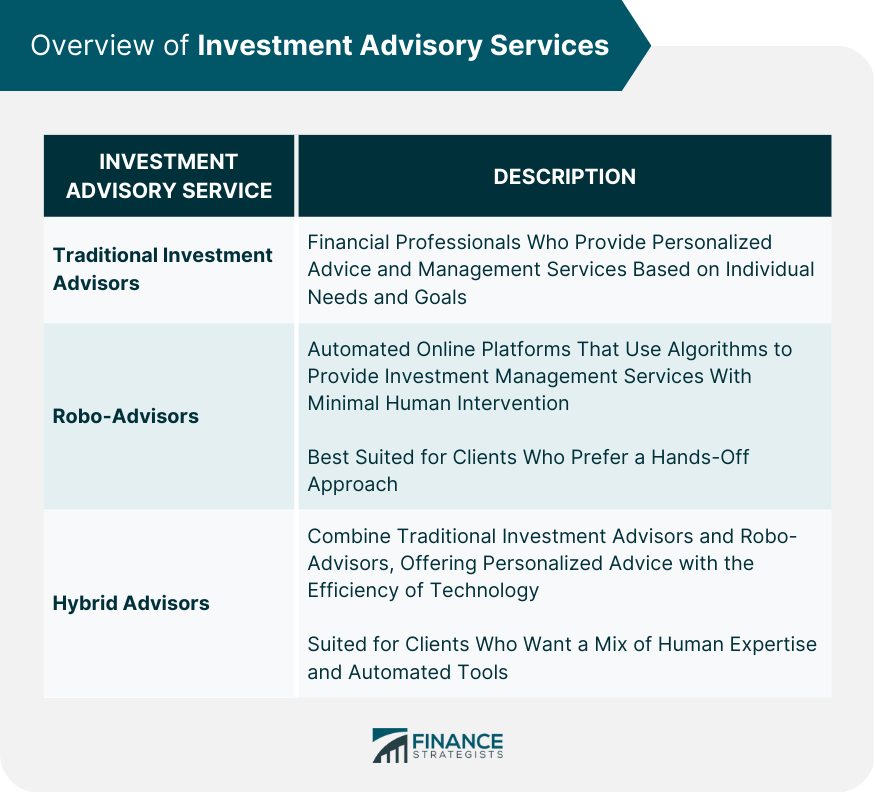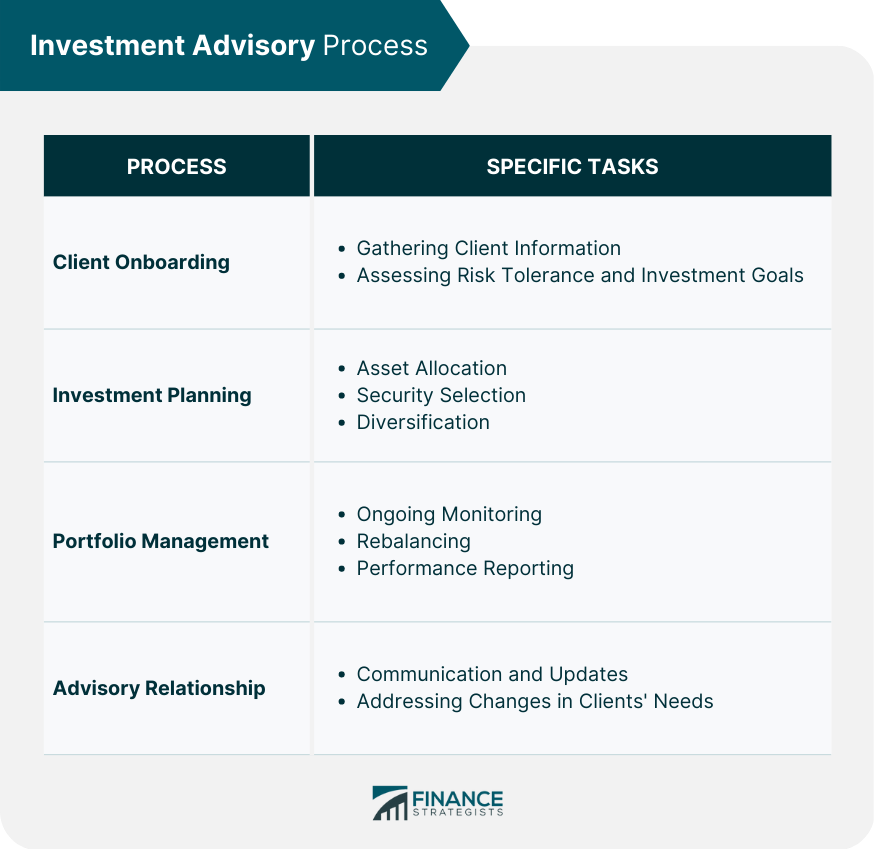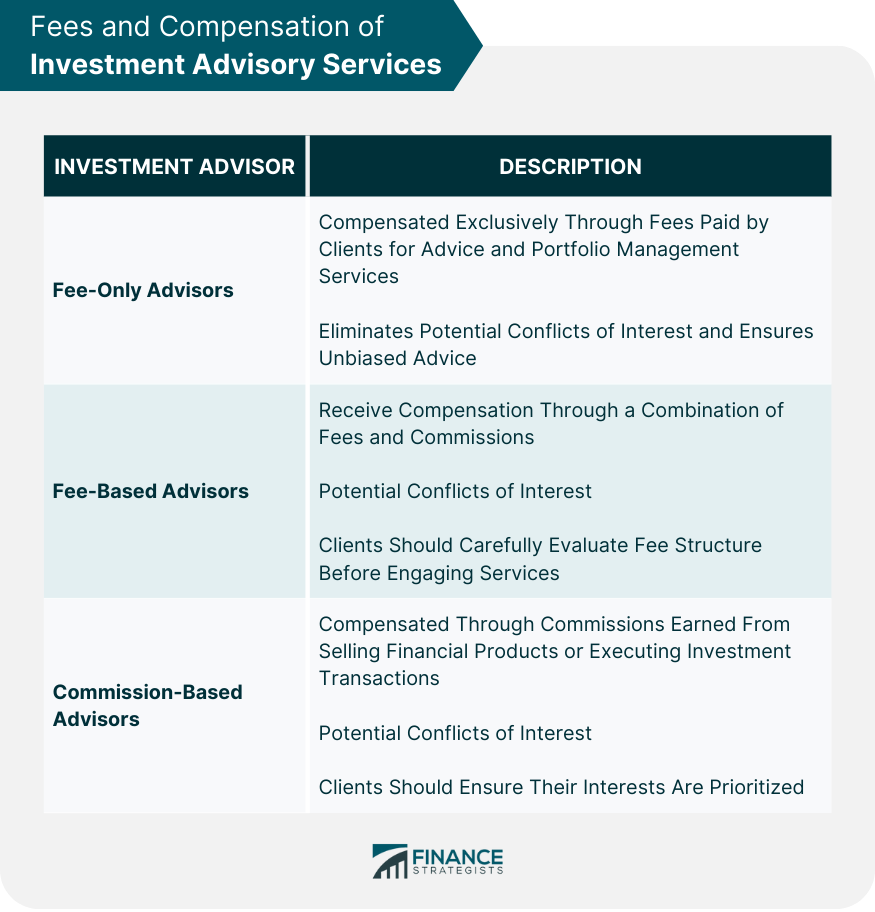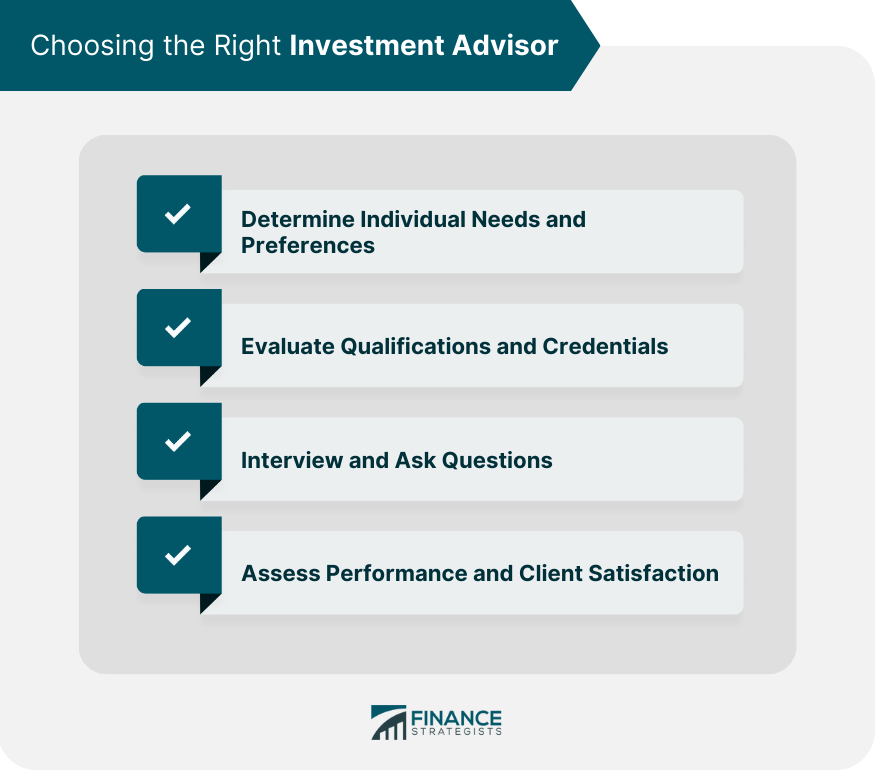Investment advisory services play a crucial role in helping individuals and organizations achieve their financial goals. These services encompass a wide range of financial planning and portfolio management activities. Clients may include individuals, families, corporations, and institutional investors with unique needs and objectives. Traditional investment advisors are financial professionals who provide clients personalized advice and management services. They often have years of experience and hold advanced certifications or degrees. Traditional advisors typically work directly with clients, offering tailored investment strategies based on individual needs and goals. Robo-advisors are automated online platforms that provide investment management services using algorithms and minimal human intervention. These platforms have gained popularity due to their lower costs, convenience, and accessibility. Robo-advisors are best suited for clients who require basic investment management services and prefer a hands-off approach. Hybrid advisors combine the best of traditional investment advisors and robo-advisors. They offer personalized advice with the added efficiency and cost-effectiveness of the technology. Hybrid advisors cater to clients who want a mix of human expertise and automated tools to manage their investments. The client onboarding process begins with collecting essential information about the client's financial situation, goals, and risk tolerance. This information helps advisors create a tailored investment strategy. It may include personal details, income, expenses, assets, liabilities, and investment preferences. Understanding a client's risk tolerance and investment goals is vital for designing a suitable investment plan. Risk tolerance refers to an individual's willingness to accept potential losses in pursuit of higher returns. Investment goals may include saving for retirement, funding a child's education, or growing wealth over time. Asset allocation is the process of dividing an investment portfolio among different asset classes, such as stocks, bonds, and cash. This strategy balances risk and reward based on a client's risk tolerance, investment horizon, and financial goals. Proper asset allocation can help optimize returns while minimizing risk. Security selection involves choosing specific investments within each asset class to include in a client's portfolio. Advisors may employ various strategies, such as fundamental analysis, technical analysis, or quantitative analysis, to identify securities that align with a client's investment objectives. This process is crucial for constructing a well-balanced and diversified portfolio. Diversification is a risk management technique that involves investing in a wide range of securities to reduce the impact of poor performance from a single investment. By spreading risk across multiple investments, clients can achieve more stable returns over time. Diversification is a fundamental principle in investment management and a key component of any sound investment plan. Ongoing monitoring is crucial for ensuring a client's portfolio remains aligned with their investment goals and risk tolerance. Advisors regularly review clients' portfolios to assess performance and identify any necessary adjustments. This process enables advisors to make timely decisions and help clients stay on track to achieve their financial objectives. Rebalancing is the process of adjusting a client's portfolio to maintain the desired asset allocation. As market conditions change, certain investments may outperform or underperform, causing the portfolio's allocation to deviate from the original strategy. Regular rebalancing helps maintain the appropriate risk level and ensures the portfolio remains consistent with the client's investment objectives. Performance reporting is essential for keeping clients informed about their portfolio's progress and the effectiveness of the advisor's strategy. Advisors provide periodic performance reports that include information on investment returns, portfolio composition, and comparisons to relevant benchmarks. These reports allow clients to evaluate their portfolio's performance and make informed decisions about their investments. Effective communication is crucial for maintaining a strong advisory relationship. Advisors should regularly update clients on market developments, portfolio performance, and any changes in their financial situation. Open and transparent communication fosters trust and ensures that clients remain engaged and informed about their investments. Clients' financial needs and goals may change over time due to life events, shifts in risk tolerance, or evolving market conditions. Advisors must be proactive in identifying and addressing these changes to ensure that clients' portfolios continue to align with their objectives. This adaptability is essential for maintaining long-term client relationships and achieving desired financial outcomes. The Investment Advisers Act of 1940 is a U.S. federal law that regulates investment advisors and establishes their fiduciary duty to clients. The Act requires investment advisors to register with the Securities and Exchange Commission (SEC) and adhere to specific regulations and disclosure requirements. This legislation seeks to protect investors and maintain the integrity of the investment advisory industry. Investment advisors must comply with federal and state regulations, overseen by the SEC and state securities regulators, respectively. These regulations are designed to protect investors and ensure that advisors act in their clients' best interests. Compliance with these regulations is critical for maintaining an advisor's reputation and avoiding potential penalties or legal actions. Investment advisors have a fiduciary duty to act in their clients' best interests, which includes providing accurate and unbiased advice, disclosing any conflicts of interest, and maintaining client confidentiality. This obligation is a cornerstone of the investment advisory industry and essential for building trust with clients. Advisors who breach their fiduciary duty may face legal consequences and damage their professional reputation. Investment advisors are expected to adhere to a code of ethics and maintain high standards of professional conduct. These guidelines promote ethical behavior, integrity, and accountability within the industry. Upholding these principles is essential for preserving the public's trust and ensuring that clients receive the best possible advice and service. Fee-only advisors are compensated exclusively through fees paid by their clients for advice and portfolio management services. These fees may be charged as a percentage of assets under management, a flat fee, or an hourly rate. Fee-only advisors do not receive commissions, which helps eliminate potential conflicts of interest and ensures that their advice is unbiased. Fee-based advisors receive compensation through a combination of fees and commissions. While they charge clients for advice and portfolio management services, they may also earn commissions from selling financial products or making specific investment recommendations. This compensation structure may create potential conflicts of interest, and clients should carefully evaluate an advisor's fee structure before engaging their services. Commission-based advisors are compensated through commissions earned from selling financial products or executing investment transactions on behalf of clients. This compensation structure can create potential conflicts of interest, as advisors may be incentivized to recommend products or transactions that generate higher commissions. Clients should carefully consider the implications of working with a commission-based advisor and prioritise their interests. Before selecting an investment advisor, clients should assess their financial needs, goals, and preferences. Factors to consider include investment objectives, risk tolerance, time horizon, and desired level of involvement in the investment process. Understanding these factors can help clients identify the most suitable advisor for their unique circumstances. Clients should evaluate potential advisors based on their qualifications, experience, and credentials. This may include reviewing an advisor's education, professional designations, and industry affiliations. Credentials such as Certified Financial Planner (CFP) or Chartered Financial Analyst (CFA) can indicate a high level of expertise and commitment to professional standards. Interviewing potential advisors and asking targeted questions can help clients better understand an advisor's approach, philosophy, and compatibility with their needs. Clients should inquire about the advisor's investment strategy, communication style, fees, and performance history. These discussions can help clients decide which advisor is best suited to help them achieve their financial goals. Evaluating an advisor's past performance and client satisfaction can provide insight into their ability to deliver positive results. Clients should request references, review testimonials, and consider any complaints or disciplinary actions against the advisor. While past performance does not guarantee future results, a consistent track record can be a strong indicator of an advisor's capabilities. Technological advancements are transforming the investment advisory landscape, with innovations such as artificial intelligence, machine learning, and big data analytics playing an increasingly prominent role. These technologies can enhance advisors' ability to analyze markets, manage risk, and deliver customized advice. Embracing technology will be critical for advisors seeking to remain competitive and meet the evolving needs of their clients. As investors become more sophisticated and demanding, the need for personalized and customized investment solutions will continue to grow. Advisors who can tailor their services to clients' individual needs and preferences will be better positioned to succeed in a competitive market. This trend highlights the importance of understanding clients' unique circumstances and delivering tailored advice that aligns with their goals. Environmental, social, and governance (ESG) investing has gained significant momentum in recent years, reflecting investors' increasing focus on sustainable and responsible investing. As demand for ESG investment options grows, advisors will need to incorporate these considerations into their offerings and stay informed about best practices in this area. This trend represents both an opportunity and a challenge for advisors seeking to adapt to changing client preferences. The investment advisory industry is subject to ongoing regulatory changes and evolving industry standards. Advisors must stay informed about new regulations, compliance requirements, and best practices to ensure that they continue to meet their fiduciary obligations and provide clients with the highest quality service. Staying current on regulatory developments is crucial for maintaining an advisor's reputation and avoiding potential legal or financial consequences. Investment advisory services play a vital role in helping clients achieve their financial goals through tailored advice, portfolio management, and ongoing support. If you're looking to achieve financial success and need guidance on how to get there, consider working with a wealth management firm. By staying informed, embracing innovation, and maintaining high standards of professional conduct, investment advisors can deliver exceptional value to their clients and contribute to the growth and success of the industry. What Is Investment Advisory Services?
Overview of Investment Advisory Services
Traditional Investment Advisors
Robo-Advisors
Hybrid Advisors

Investment Advisory Process
Client Onboarding
Gathering Client Information
Assessing Risk Tolerance and Investment Goals
Investment Planning
Asset Allocation
Security Selection
Diversification
Portfolio Management
Ongoing Monitoring
Rebalancing
Performance Reporting
Advisory Relationship
Communication and Updates
Addressing Changes in Clients' Needs

Regulation and Compliance of Investment Advisory Services
Investment Advisers Act of 1940
SEC and State Regulations
Fiduciary Duty
Code of Ethics and Professional Conduct
Fees and Compensation of Investment Advisory Services
Fee-Only Advisors
Fee-Based Advisors
Commission-Based Advisors

Choosing the Right Investment Advisor
Determining Individual Needs and Preferences
Evaluating Qualifications and Credentials
Interviewing and Asking Questions
Assessing Performance and Client Satisfaction

Future Trends in Investment Advisory Services
Technological Advancements
Personalization and Customization
Growing Importance of ESG Investing
Changes in Regulation and Industry Standards
Final Thoughts
Investment Advisory Services FAQs
Investment advisory services refer to a range of financial planning and portfolio management activities that help individuals and organizations achieve their financial goals. Clients may include individuals, families, corporations, and institutional investors with unique needs and objectives.
To choose the right investment advisor, clients should assess their financial needs, goals, and preferences. They should evaluate potential advisors based on their qualifications, experience, and credentials, interview them, ask questions, and assess their past performance and client satisfaction.
There are different types of investment advisors, including traditional advisors, robo-advisors, and hybrid advisors. Traditional advisors offer personalized advice and management services, while robo-advisors provide investment management services using algorithms and minimal human intervention. Hybrid advisors combine traditional advisors and robo-advisors, offering personalized advice with the efficiency of technology.
Potential conflicts of interest in investment advisory services may arise from advisors' compensation structures, such as fee-only, fee-based, or commission-based. Clients should carefully evaluate an advisor's fee structure before engaging their services to ensure that their interests are prioritized.
Future trends in investment advisory services include technological advancements, personalization and customization, the growing importance of ESG investing, and changes in regulation and industry standards. Investment advisors must embrace innovation and maintain high standards of professional conduct to deliver exceptional value to their clients and contribute to the growth and success of the industry.
True Tamplin is a published author, public speaker, CEO of UpDigital, and founder of Finance Strategists.
True is a Certified Educator in Personal Finance (CEPF®), author of The Handy Financial Ratios Guide, a member of the Society for Advancing Business Editing and Writing, contributes to his financial education site, Finance Strategists, and has spoken to various financial communities such as the CFA Institute, as well as university students like his Alma mater, Biola University, where he received a bachelor of science in business and data analytics.
To learn more about True, visit his personal website or view his author profiles on Amazon, Nasdaq and Forbes.















